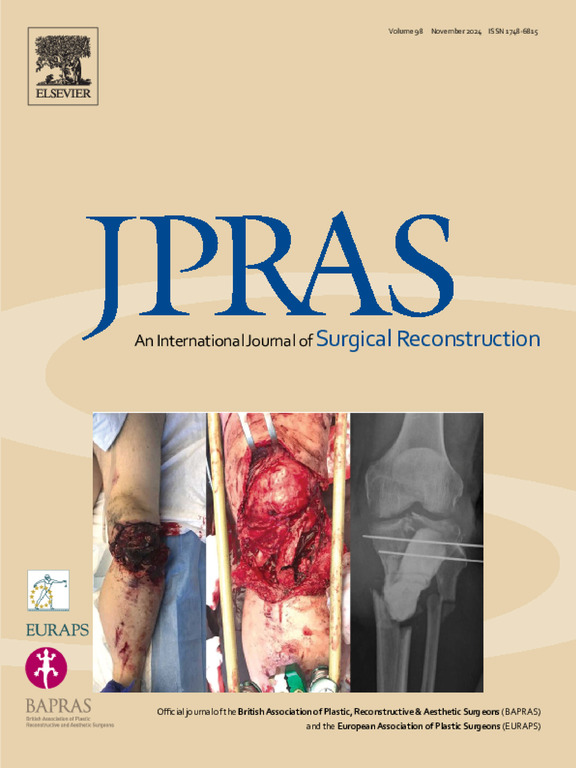Increased instruction or decreased opportunity? How co-surgeons and fellows impact resident training in microsurgery
IF 2.4
3区 医学
Q2 SURGERY
Journal of Plastic Reconstructive and Aesthetic Surgery
Pub Date : 2025-08-19
DOI:10.1016/j.bjps.2025.08.016
引用次数: 0
Abstract
Background
Microsurgical reconstructions are incredibly demanding, and many plastic surgeons perform these procedures with a co-surgeon (CSM), or a microsurgical fellow (MSF). Although both the CSM and MSF have their benefits, there is currently a lack of understanding of how these additions impact the microsurgical training of residents.
Methods
An electronic survey of plastic surgical residents was sent via the American Council for Educators in Plastic Surgery (ACEP) distribution service. Questions included details regarding the level of training, program characteristics, and the use of the CSM/MSF at their institution. A 5-point Likert scale (Very Positive to Very Negative) was used to assess the impact of the CSM/MSF on microsurgical education.
Results
One hundred thirty-four residents with an average of 4 years (SD =1.95) of plastic surgery training completed the survey. The CSM was used at 95 (71%) and MSF at 37 (27%) programs. Residents felt the CSM was positive for their training (45% positive vs. 23% negative), while MSF was seen as more negative (15% positive vs. 57% negative). Residents at programs with the CSM and/or MSF had a significantly more positive outlook (53% CSM and 32% MSF) compared to those training at institutions without (24% CSM and 8% MSF) (p<0.001).
Conclusion
Residents at programs utilizing these tools had a much more positive outlook compared to those without. As institutions adopt CSM or bring MSF into their program, they should consider resident concerns and ensure that the CSM and MSF are a help and not a hindrance to resident learning.
增加指导还是减少机会?联合外科医生和研究员如何影响显微外科住院医师培训
显微外科手术重建的要求非常高,许多整形外科医生都是在联合外科医生(CSM)或显微外科医生(MSF)的帮助下进行这些手术的。尽管CSM和MSF都有各自的好处,但目前还缺乏对这些附加功能如何影响住院医生显微外科培训的理解。方法通过美国整形外科教育工作者委员会(ACEP)分发服务对整形外科住院医师进行电子调查。问题包括有关培训水平、项目特点以及在机构中使用CSM/MSF的细节。采用李克特5分量表(Very Positive至Very Negative)评估CSM/MSF对显微外科教育的影响。结果134名住院医师完成调查,平均接受过4年(SD =1.95)的整形外科培训。95例(71%)采用CSM, 37例(27%)采用MSF。居民认为CSM对他们的培训是积极的(45%积极对23%消极),而MSF被认为是更消极的(15%积极对57%消极)。与在没有CSM和MSF的机构接受培训的居民(24% CSM和8% MSF)相比,在CSM和/或MSF项目中接受培训的居民(53% CSM和32% MSF)有更积极的前景(p<0.001)。结论:与没有使用这些工具的住院医生相比,使用这些工具的住院医生有更积极的前景。当机构采用CSM或将MSF纳入他们的项目时,他们应该考虑住校学生的担忧,并确保CSM和MSF对住校学生的学习是一种帮助,而不是阻碍。
本文章由计算机程序翻译,如有差异,请以英文原文为准。
求助全文
约1分钟内获得全文
求助全文
来源期刊
CiteScore
3.10
自引率
11.10%
发文量
578
审稿时长
3.5 months
期刊介绍:
JPRAS An International Journal of Surgical Reconstruction is one of the world''s leading international journals, covering all the reconstructive and aesthetic aspects of plastic surgery.
The journal presents the latest surgical procedures with audit and outcome studies of new and established techniques in plastic surgery including: cleft lip and palate and other heads and neck surgery, hand surgery, lower limb trauma, burns, skin cancer, breast surgery and aesthetic surgery.

 求助内容:
求助内容: 应助结果提醒方式:
应助结果提醒方式:


